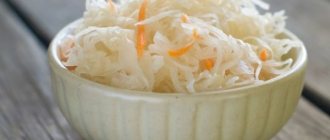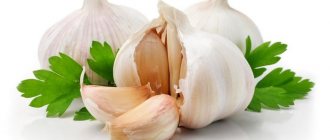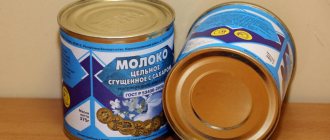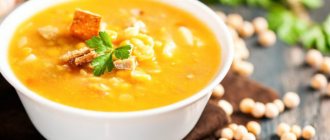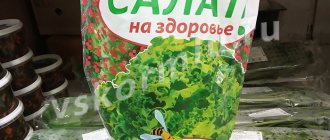Is it possible to have onions while breastfeeding?
The main complaints about onions that can be heard in the context of a diet for breastfeeding are the presence in it of a large amount of the flavonoid quercetin, which, according to some experts, can spoil the taste of breast milk and cause problems with the gastrointestinal tract in the baby.
Important! Any product eaten by the mother can cause an individual reaction in the child, therefore the main rule of the nursing diet is the gradual introduction of the product and, if possible, keeping a food diary. This is especially important for children who have a genetic tendency to allergies.
In reality, the taste and composition of breast milk are never constant, changing not only in accordance with a woman’s diet, but also depending on her hormonal levels and lifestyle (for example, physical activity). It is nature for babies to adapt to these changes, getting used to different tastes.
Only 5% of picky people can refuse breastfeeding if they don’t like the taste of milk. In addition, colic and flatulence are usually associated only with eating raw vegetables. That is why we can say with confidence that a nursing mother can and even should eat onions, but strictly following the recommendations that will be discussed below.
Contraindications to eating onions
Despite the many positive characteristics of the plant, there are restrictions on use during lactation.
We recommend reading: Walnuts during breastfeeding
Contraindications:
- Pathologies of the stomach, intestines and related organs
- Asthma
- High blood pressure
Young mothers do not always know whether they can eat onions while breastfeeding. The vegetable is prohibited for consumption in all forms if a woman suffers from asthmatic attacks, is susceptible to allergies, and also has high blood pressure.
Bulbs or feathers consumed in large quantities cause heartburn, vomiting, nausea and general malaise.
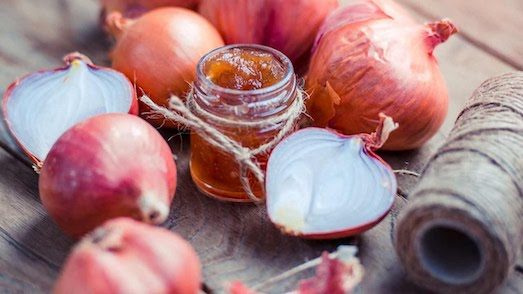
Properties of onions for a nursing mother
This is an ingredient in many holiday and everyday dishes. It's hard to imagine cooking soup, stew or stir fry without adding onions. It not only improves the taste of the dish, giving it a special aroma, but also has many beneficial properties.
It will be useful for you to know the properties and differences between red and white onions.
Benefit
- This vegetable has:
- a wealth of vitamins and minerals that can prevent the development of vitamin deficiency in a young mother;
- the presence of phytoncides that serve as protection against harmful microbes;
- control of blood sugar levels;
- antioxidant effect with the help of the above-mentioned quercetin and ascorbic acid;
- normalization of intestinal function, prevention of constipation;
- reducing the amount of low-density lipoproteins in the blood, preventing cardiovascular diseases.
Harm and contraindications
- When introducing this vegetable into the diet, the following nuances should be taken into account:
- like any product, it can cause an allergic reaction in a child, resulting in hives and bowel dysfunction;
- excessive consumption can cause gastrointestinal problems in both the mother (heartburn) and the child (colic, increased gas formation);
- For mothers suffering from asthma, hypertension, diseases of the gastrointestinal tract, kidneys, liver and gall bladder, onion consumption is possible only with the permission of a doctor and in minimal quantities.
Can a nursing mother eat onions and what are their benefits?
Onions can be called one of the most popular vegetables in principle. It is added to soups, main courses, meat dishes, and fresh it can often be found in salads. Thanks to this product, food acquires a bright taste and pleasant aroma.
It is known that the period of breastfeeding is associated with a lot of restrictions in terms of food and products. A nursing mother has to limit herself in many ways, since some substances from her food pass into breast milk, and then into the baby. They often cause a negative reaction in the child, and therefore a woman should monitor her diet extremely carefully.
But are there similar substances in onions? In fact, absolutely any product can cause a negative reaction, and therefore their introduction requires proper organization (we will talk about the basic rules of this procedure below). However, there are no specific prohibitions on onions, be it the head of an onion vegetable or the feathers of a green one.
The only thing that should definitely be mentioned is the possibility of changing the taste of breast milk. Since onions are a fairly aromatic product, in large quantities they can affect the taste of mother's milk. Perhaps such changes will not be to the liking of the baby, and therefore the measure must be observed in moderation.
Otherwise, onions are a truly healthy vegetable. The list of its beneficial properties allows us to understand why pediatricians around the world are so loyal to this product.
- Onions contain a lot of vitamins and microelements . Since after childbirth a woman experiences a deficiency of nutrients - most of them are spent on saturating breast milk, her need for them is extremely high. Onions help to quickly recover and have a beneficial effect on overall health.
- It has been scientifically proven that onions can have a positive effect on the health of the cardiovascular system. This vegetable lowers cholesterol levels in the blood and also cleanses blood vessels . As a result, this reduces the load on the circulatory system and reduces the risk of developing related diseases.
- The development of gestational diabetes during lactation is not uncommon. Onions help control blood sugar levels , reducing and stabilizing them. This eliminates the main symptoms of this disease and helps to get rid of it as quickly as possible.
- Onions contain a number of substances that can reduce the risk of cancer . These are mainly quercetin and vitamin C. Both of these compounds are antioxidants, and therefore remove toxic substances from the body, including free radicals. Antioxidant substances are also known for their positive effect on the immune system, they strengthen it and help the body better resist any disease.
- Onions will also help with respiratory diseases . Since most medications are prohibited during breastfeeding, natural remedies are especially useful. Onions destroy pathogenic bacteria in the nasopharynx and promote a speedy recovery.
- Onions contain significant amounts of iron . This microelement is necessary for our body to create blood, which means it indirectly affects the amount of milk produced.
- Some of the substances from onions promote better digestion. These compounds normalize the functioning of both the stomach and intestines. As a result, conditions such as diarrhea or constipation are excluded. In addition, they also have a beneficial effect on the urinary system.
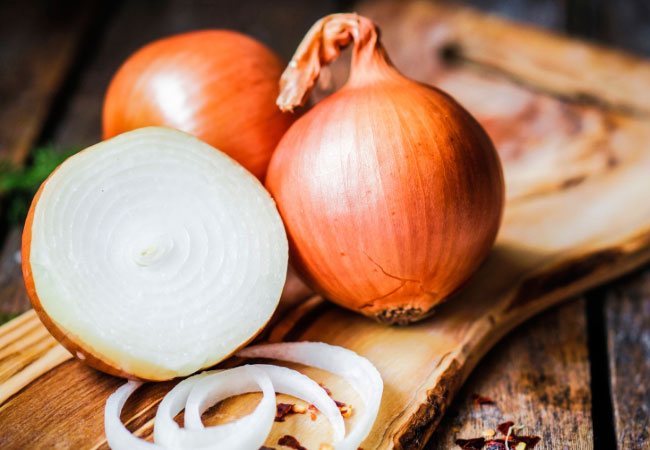
How to choose a good bow
When breastfeeding a child, a woman should pay special attention to the quality of the products included in her diet.
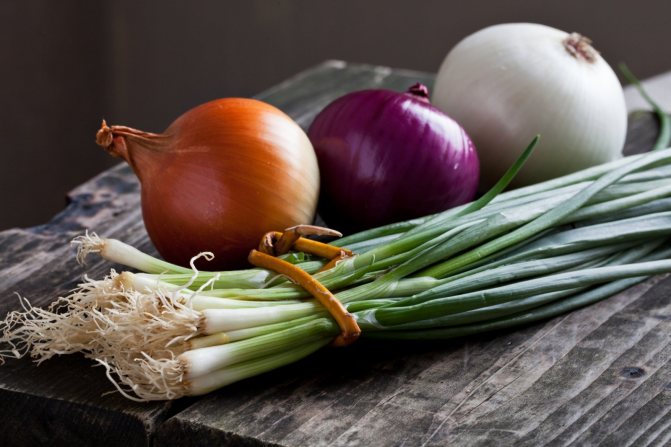
A good, fresh vegetable meets the following requirements:
- onion size is about 5 cm (too large or small heads are misgraded);
- dense, not loose head with dry husk and white, juicy contents;
- lack of green germinating feathers;
- absence of sprouted roots at the bottom of the onion;
- absence of mold, rot and unpleasant, too strong odor.
How does onion affect the composition of breast milk?
Many people doubt whether nursing mothers can eat onions. This is due to the fact that it contains a substance that imparts bitterness. It is also known that, for example, the composition of cow's milk is greatly influenced by the composition and type of feed that is given to livestock. If a cow eats bitter grass and other plants that have a tart taste, then the milk will taste bitter and have a characteristic odor.
Therefore, of course, if you eat onions in large quantities, they will also affect the composition of the milk. However, this is associated only with the consumption of the green part of the plant. Fried onions do not change the taste of breast milk. Also, some babies begin to refuse milk if it changes its taste. There are quite a lot of products that affect its taste composition.
Since the green part of the plant is extremely useful during the postpartum period, the right solution would be to gradually include it in the diet. At the same time, there is a gradual change in the taste of the milk and, thus, the baby calmly gets used to minor changes in taste. It is not recommended to eat raw onions in the first weeks after the baby is born.

In what form is it best to consume?
In the first month after birth, onions should be heat treated. Boiled and stewed vegetables minimize the negative impact of flavonoids on a child’s fragile intestines. In the future, you can add some fresh vegetables to salads. It is not recommended to get carried away with fried onions, as carcinogens are released during frying, and the vegetable itself loses its beneficial qualities. As a dressing for soups, it is better to fry it in butter. Pickled onions are harmful to both mother and baby due to the effects of acetic acid.
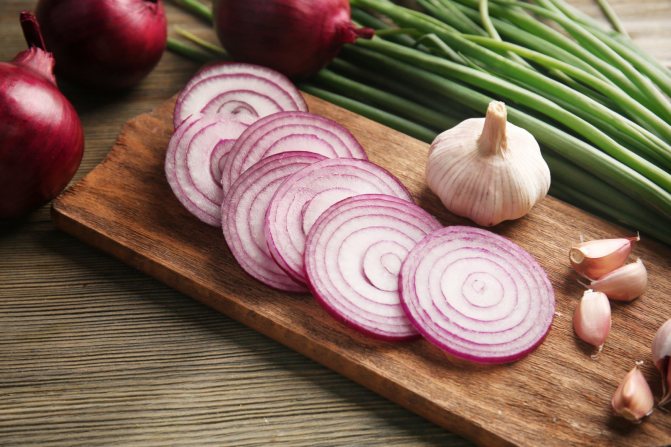
Beneficial features
Onion is a very common plant, the bulb and feathers of which have been used as food and used to treat diseases for about 4 thousand years.

When breastfeeding, green onions are very useful, especially considering their ability to fight pathogenic bacteria.
Onions contain:
- vitamins C, PP, E, B;
- microelements (iron, potassium, sulfur, calcium, chlorine, phosphorus);
- carotene;
- organic acids;
- quercetin (this substance gives onions bitterness);
- phytoncides.
Green onions help replenish the lack of vitamins in the winter-spring period, because they can be grown on your windowsill. Whereas vegetables and fruits in stores contain a lot of chemicals and few useful vitamins.
- Get rid of constipation, this is especially important in the first months after childbirth.
- Recover from colds faster. A substance called “phytoncide” helps with this, which inhibits the growth of pathogenic bacteria. This is a very valuable property of onions due to the fact that pharmaceutical medications are prohibited during hepatitis B.
- Strengthen your immune system.
- Increase breast milk production.
- Raise blood pressure.
- Restore weight, return to the figure you had before pregnancy.
The effect of onions on breast milk
It is widely believed that onions can spoil the taste of breast milk and the baby will refuse to eat. This statement is true for fresh onions. However, it is far from 100%. Only 5% of babies refuse to breastfeed if there is a significant change in the taste of mother's milk.
In any case, in the first month after childbirth, it is not recommended to eat any raw foods, and onions are no exception. Add green onions to soup, porridge, and meat when cooking - heat-treated onions are safe and healthy.
How to properly introduce onions into your diet
Onions are introduced into the diet of a nursing mother in stages:
- In the first few months after birth, it is stewed, boiled or baked, trying to add it to dishes in small portions (about 10–15 g), preferably in the first half of the day, to make it easier to track changes in the baby’s well-being. If problems with digestion occur (flatulence, pressing the legs towards the stomach, abnormal stool), the vegetable is temporarily removed from the diet.
- After the famous “100 days of crying” (this is what the first 3 months of life are called in Asian countries, known in our country as the period of infant colic), you can try adding a small amount of raw vegetable to the diet, starting with 10 g and following the precautions indicated above. Before use, you can scald it with boiling water, this will remove some of the bitterness. If a negative reaction occurs, the product is removed from the diet for 1–2 months. You can also try leeks and red onions, which have a milder flavor.
- At 3–4 months after birth, it is allowed to include raw green onions in the diet, starting with the smallest portions.
- Onion soups and pies can be eaten no earlier than 6 months after childbirth, because they contain too much of the vegetable, even if it is thermally processed.
Did you know? The German city of Weimar has held an annual autumn onion festival for 365 years, where you can try not only pies and stews, but also onion ice cream, cakes and onion rings in powdered sugar.
Despite the presence of essential oils and a specific aroma in onions, a nursing mother should not refuse to use it. You just need to observe moderation and gradualness when introducing it into the diet, and also remember about possible individual reactions to the product.
Vegetables to eat with caution
Now you know what a nursing mother can eat. We are not saying that everything else is strictly prohibited. But they should be used very carefully. Among them:
- Cucumbers
. Low-calorie and low-allergenic product that can cause gas. Therefore, do not abuse it (in particular, until the child is 1 month old). - Tomatoes
. Rich in iron, zinc and calcium. But it is better not to introduce them into the diet of a baby up to a month old - the risk of an allergic reaction is quite high. As an alternative, you can try yellow varieties of tomatoes.
- White cabbage)
. May cause bloating. But if you really want to, try not to eat it fresh or pickled, preferring boiled and stewed. - Garlic and onion
. Healthy, but give milk a specific taste. Therefore, the toddler may refuse to breastfeed.
Leek appetizer recipe for breastfeeding
Ingredients
- Leeks - 3-4 stalks;
- Carrots – 1 pc.;
- Apple – 1 pc.;
- Egg – 2 pcs.;
- Cheese – 50 g;
- Sour cream – 0.5 cups.
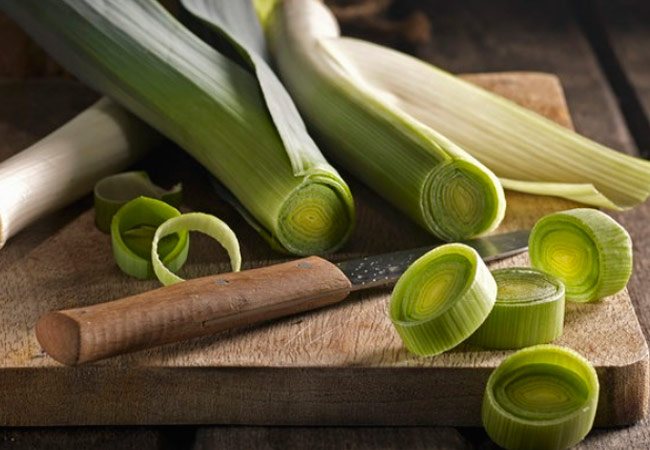
Cooking method
- Boil hard-boiled eggs, chop.
- Cut the onions and carrots into thick rings and simmer for a short time.
- Cut the apple into slices.
- Three parmesan on a coarse grater.
- Place onions, carrots, apples, eggs in layers in a deep plate, sprinkle with cheese, flavor with sour cream, and put in the refrigerator so that the salad is soaked.
The benefits of stewed onions for breastfeeding
In addition to a huge number of valuable properties in cooking, onions have found their use in folk medicine. It is used as a means to prevent and treat many diseases.
Onions are used for:
- Vitamin deficiency. Onions are able to replenish the deficiency of minerals and vitamins in the body, especially in the winter season, when the choice of vegetables and fruits is not varied enough.
- Viral and colds . Traditional medicine recipes with onions are familiar to everyone, because since childhood, many people have been heavily eating onions when the first signs of a cold or flu appear. This fact is explained by the fact that substances in onions reduce the growth and development of harmful microorganisms.
- Constipation. In this case, it is important for women to eat stewed onions after childbirth, since during this period many of them suffer from this phenomenon.
Onions have a weak diuretic effect, which is good for stimulating kidney function. In addition, stewed onions have a low calorie content (about 50 kcal / 100 g of product), which is undoubtedly a big plus for women in the postpartum period.
The vitamin and mineral composition of onions is quite diverse and includes:
- vitamins of groups B, C, E and PP;
- iron;
- potassium;
- phosphorus;
- organic acids and many other useful substances.
A positive argument in favor of consuming stewed onions is the fact that after heat treatment, almost all useful substances remain in the composition of this product. In addition, during the stewing process, the onion becomes softer and stops tasting bitter. Such onions irritate the gastric mucosa less, which means they are more easily absorbed by the body.


